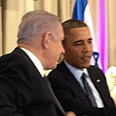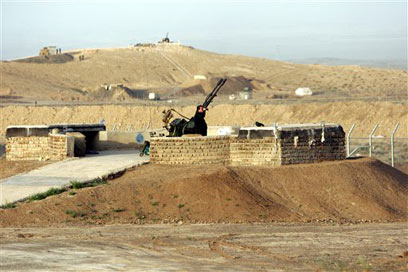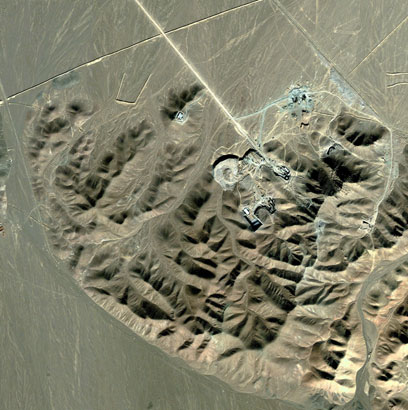
Obama and Netanyahu's new red line
Analysis: Israeli government banking on US promise to strike Iran should diplomacy, sanctions fail to stop nuke program
Tehran and Damascus view the contradicting assessments made by senior Israeli and American officials as a sign of diplomatic weakness in the Western camp. It indicates to them that there is a problem in gathering intelligence and a fear of anything that even smells of military action.
It is safe to assume that the ayatollahs, headed by Khamenei, and senior Assad regime officials understand now they can continue stretching the rope when it comes to unconventional weapons and substances and that the red lines laid down by the US and Israel are no more than a suggestion. The Israeli public (and most likely the American public as well) is confused and concerned. The civilians sense that the institutions in Jerusalem and Washington do not know how close Iran is to a nuclear bomb, or are hiding the truth from the public. They also sense that their leaders have not decided if, or how, the dangers posed by Syria's vast chemical weapons stockpile can be neutralized.
What's really frustrating is that the actual situation, at least according to the more credible intelligence assessments, is not that bad – at least according to the latest, most credible intelligence assessments. It can be said with a high degree of certainty that while Iran does have the technological capabilities to produce within a few months enough weapons-grade material for one atomic bomb, it does not yet possess the proven capabilities to build the weapon itself – meaning the bomb or warhead. Moreover, at this point the Iranians are refraining from producing the amount of weapons-grade uranium required to fuel even a prototype of an atomic bomb. Instead, they are working to improve their technical and technological capabilities in order to able to produce weapons-grade material and build a bomb within a short period of time, if and when the supreme leader decides that the time has come take the nuclear program to the next level.
It's a little complicated, so in order to simplify things let's say that at this point the regime in Tehran is focusing on improving its ability to produce an atomic bomb, but at the same time it is showing that it does not want to implement these capabilities. This assessment is supported by updated information obtained by the International Atomic Energy Agency and Western intelligence. According to these estimations, a year, maybe even three, will pass from the moment Khamenei decides he wants to possess a nuclear bomb until this decision is actually implemented.

Revolutionary Guards protecting Natanz nuclear plant (Photo: AP)
So what is the basis of the claim that the decision on whether or not to attack Iran must be reached by the end of 2013? The answer is that by the end of this year Iran may cross the red line set by Netanyahu at the UN General Assembly. This red line is 240 kilograms of 20%-enriched uranium, which is enough for the production of one nuclear warhead if it is enriched to a 90% fissile purity level. Netanyahu said this red line may be crossed by the summer, but the all the figures indicate it is doubtful Tehran will cross Bibi's red line this year.
However, the mere act of presenting a red line caused damage to Israel's interests. The entire world is waiting to see what Israel will do in case the IAEA announces that Iran has accumulated 240 kg of 20%-enriched uranium. If Israel does not act, its credibility and deterrence will be further eroded – not only in the eyes of Iran, but also in the eyes of other regional enemies that are waiting for the first sign of weakness from the Jewish state. It must be remembered that Israel already lost some of its credibility when it moved the red line upwards. It happened sometime in 2012, when Ehud Barak and Netanyahu suddenly stopped talking about the "zone of immunity" as a red line which, if crossed, would justify a go-it-alone Israeli strike. Instead, they began talking about uranium enriched to a 20% fissile purity level.

Nuclear facility at Fordo (Photo: EPA)
The reason for this change in rhetoric is simple: At the time Iran had already crossed Israel's original red line when it began activating the underground nuclear facility at Fordo, thus placing its nuclear program in the "immunity zone." Recently, following Barak's departure from the Defense Ministry, Netanyahu once again moved the red line upwards. This time he acted wisely and did it secretly during a meeting with Barack Obama. According to various reports, the American president and the Israeli PM agreed on a new plan to block Iran's nuclear program, which calls for narrowing the gap between the Israelis and American red lines. Obama moved his red line down, Netanyahu moved his up. Meaning, Netanyahu's previous red line, as presented during his UN speech, is no longer valid. Although, because of the secrecy, it is hard to ascertain whether a new Israeli red line even exists or whether it was replaced by an Israeli-American agreement to reach a joint decision regarding the possible use of military force against Iran.
Obama promised Netanyahu that if diplomatic efforts fail and the economic sanctions do not dissuade Iran from moving forward with its nuclear program and taking direct steps toward building an atomic bomb, the US would act military to thwart these efforts.
The American leader also gave Netanyahu the "yellow light" for a unilateral operation against Iran. The light will turn green should the Israeli government conclude, after consulting with Washington, that is must bomb Iran in order to defend itself. Israel's promise to consult with the US prior to a go-it-alone attack will secure Washington's diplomatic, military and logistical support - even if the White House believes the time has not yet come for military action in Iran. During his meeting with Obama, Netanyahu clarified that Israel realizes the US has superior capabilities which can delay or even destroy Iran's nuclear program – capabilities Israel does not have. Therefore, Israel prefers to wait for America to act on its own against Iran. Should Israel feel that it must act unilaterally, it wants to do so only after informing the US of its plans in advance, thus securing America's assistance.
Netanyahu and the Israeli government decided to fully trust America's commitment to use military force against Iran should all the other options to stop Iran's nuclear program fail.










